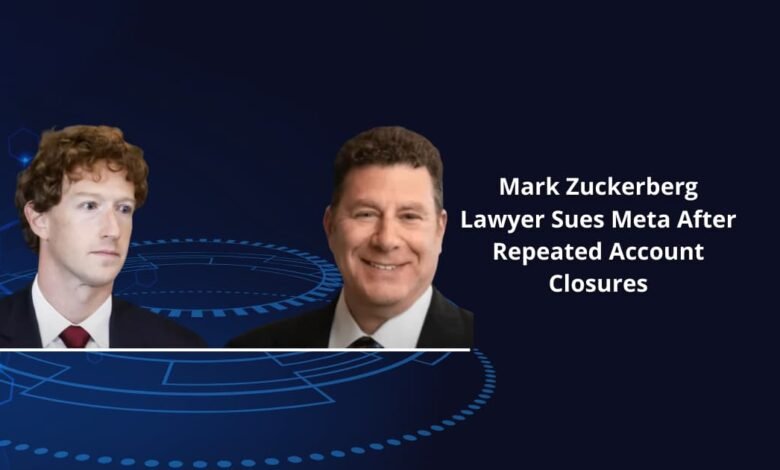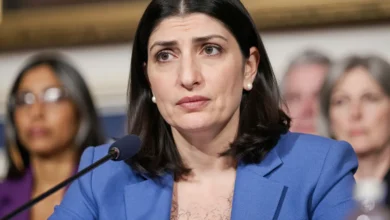Mark Zuckerberg Lawyer Sues Meta After Repeated Account Closures

Mark Zuckerberg lawyer sues Meta after his accounts were repeatedly banned over claims of impersonation, raising global debates on digital identity, corporate accountability, and online rights.
Mark Zuckerberg lawyer sues Meta Background of the Case
In a bizarre yet deeply concerning twist, a lawyer named Mark Zuckerberg has filed a lawsuit against Meta Platforms, the parent company of Facebook and Instagram. His frustration stems from repeated account closures under the allegation that he was impersonating none other than Mark Zuckerberg, the billionaire CEO of Meta.
Canelo vs Crawford: What Time Does the Fight Start Tonight?
What could have been brushed aside as a quirky coincidence has instead exposed the fragile balance between user rights and automated moderation on the world’s largest social media networks. For the lawyer, the constant bans turned into more than inconvenience—it became reputational harm, professional damage, and an assault on his right to digital existence.
The story of Mark Zuckerberg lawyer sues Meta is not simply about one individual; it is symbolic of the broader challenges ordinary people face when their identities clash with the rigid, algorithm-driven systems of tech giants.
Mark Zuckerberg Lawyer Sues Meta: The Core of the Dispute
The lawsuit argues that Meta’s enforcement systems are flawed, discriminatory, and negligent. Despite providing proof of his identity, the lawyer claims he was repeatedly locked out of his accounts without proper investigation.
His filing goes further by highlighting damages beyond mere inconvenience. According to him, Meta’s wrongful actions have:
- Harmed his professional reputation, since clients and colleagues often rely on social media as a verification tool.
- Caused emotional distress, as he faced constant suspicion for simply using his real name.
- Limited his freedom of expression, as digital platforms today are not optional luxuries but essential spaces for communication and advocacy.
This is why the phrase Mark Zuckerberg lawyer sues Meta resonates globally—it illustrates the power imbalance between individuals and corporations that can dictate online presence at will.
Digital Identity and the Role of Algorithms
At the heart of the conflict lies the issue of digital identity in the age of automation. Meta relies heavily on artificial intelligence and automated systems to detect impersonation and fraud. While these measures protect against real scammers, they often sweep up genuine users.
- Algorithmic Overreach: Systems flag accounts based solely on name similarity, without considering context.
- Limited Appeals Process: Users report that Meta’s appeals often feel like fighting a machine—responses are automated, and human review is rare.
- Disproportionate Impact: Those with famous or politically sensitive names face greater risks of wrongful bans.
The case is a sharp reminder that while AI-driven moderation is efficient, it is far from infallible. In this instance, the algorithm essentially decided that no “ordinary” person could genuinely be named Mark Zuckerberg.
Political and Economic Implications
Beyond the individual, the Mark Zuckerberg lawyer sues Meta lawsuit has wider political and economic implications.
- Reputation of Meta in Governance Debates
Meta has already faced criticism worldwide for its handling of misinformation, election interference, and content moderation. This lawsuit adds a fresh dimension: can the company even handle basic identity verification fairly? Governments already debating stricter regulation of big tech may use this case as evidence of corporate negligence. - Trust in Global Markets
Meta’s financial standing is tied to user growth and trust. Wrongful bans erode confidence, not only among ordinary users but also among businesses and advertisers. If a lawyer can be silenced simply for his name, what protection do brands and professionals truly have? - Human Rights and Freedom of Expression
International organizations increasingly argue that online platforms are central to exercising free speech. Wrongful bans, therefore, are not just private disputes—they may touch on human rights. This adds political weight to the lawsuit, potentially fueling calls for global digital rights frameworks.
Legal and Ethical Dimensions
The court battle raises several critical legal questions:
- Duty of Care: Do platforms owe users a responsibility to ensure fair identity verification?
- Liability for Algorithmic Errors: Can corporations be held accountable when AI-driven moderation causes real-world harm?
- Freedom of Speech vs. Corporate Control: At what point does banning users equate to silencing voices unjustly?
Ethically, the lawsuit highlights the imbalance of power between billion-dollar corporations and individuals. Meta’s ability to erase or silence someone with a single automated decision demonstrates a structural vulnerability in the digital age: users have little to no recourse when wrongly punished.
Public Reactions
Across Reddit, X (formerly Twitter), and other platforms, the case has triggered a mix of irony and outrage. While some laugh at the strange coincidence, most observers recognize the serious implications:
- Supporters argue that platforms must treat genuine users fairly, regardless of their name.
- Critics of Meta say this is another example of careless governance from a company already accused of mishandling global trust.
- Professionals and lawyers highlight that losing access to accounts today is akin to losing professional presence, networking opportunities, and credibility.
A Symbol of Digital Rights
Ultimately, the Mark Zuckerberg lawyer sues Meta story is not about one man but about the rights of all digital citizens.
If a lawyer with the “wrong” name can be silenced, then millions of users worldwide could face similar fates. This lawsuit could compel Meta, and potentially other tech giants, to:
- Establish stronger human-led verification processes.
- Create clearer and faster appeal systems.
- Accept greater legal accountability for wrongful bans.
The case serves as a symbol that identity online is not just a technical matter—it is tied to law, politics, economics, and human dignity.
The fact that a Mark Zuckerberg lawyer sues Meta has become global news is no coincidence. It embodies the growing tension between individuals and powerful corporations in the digital age. What began as a personal struggle over account closures has now evolved into a case that may redefine how social media companies handle identity verification and user rights.
If the lawsuit succeeds, it could mark a turning point in digital governance—forcing platforms to shift from algorithm-first enforcement to human-centered fairness. In an era where names, reputations, and identities define professional and personal life, ensuring justice online is no less important than ensuring justice offline.
Frequently Asked Questions (FAQ)
1. Who is the lawyer named Mark Zuckerberg?
He is a real attorney who shares the same name as Meta’s CEO. He claims Meta repeatedly banned his accounts under accusations of impersonation.
2. Why is he suing Meta?
He argues that Meta failed to verify his identity properly, causing professional harm, reputational damage, and emotional distress.
3. What are the wider implications of the case?
The lawsuit could push social media companies to improve verification systems and may influence political debates on digital rights and corporate responsibility.
4. Does this case affect Meta’s global image?
Yes. It raises concerns about whether Meta can govern fairly, potentially fueling calls for stricter regulations worldwide.
5. Could this set a legal precedent?
Potentially. Courts may establish whether platforms can be held liable for wrongful bans caused by algorithmic systems.
Discover more from Feenanoor
Subscribe to get the latest posts sent to your email.









